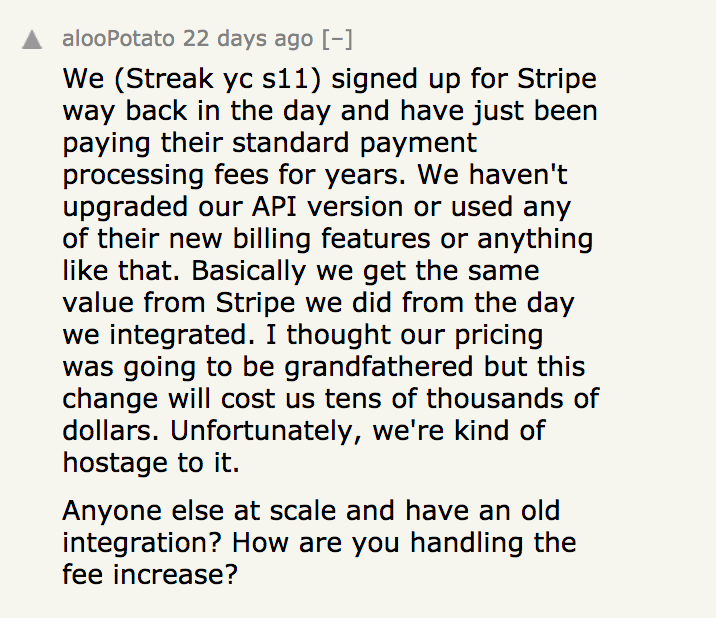On a recent Hacker News post about Stripe pricing, one of the top comments was posted by the founder of Streak.
Streak is close to a decade old, has hundreds of thousands of users, and presumably millions in annual revenue. They went through Y Combinator, the same accelerator program as Stripe. Yet, despite all this, they have apparently been on Stripe’s out of the box rate for the past nine years. Stripe offers discounted volume pricing, and Streak almost certainly could have saved tens of thousands of dollars by taking advantage of that.
Why is Streak not on a lower-fee plan, despite their qualifications? They must never have asked. Stripe will happily give volume discounts, but they don’t do it automatically. You have to ask.
The simple act of asking has made a huge difference for me, both on a business and personal level. I didn’t use to ask. I used to assume that whatever was offered was the best option available. Outside of very specific situations where there is an explicit negotiation (buying a car, flea markets, etc), I didn’t think there was any wiggle room. Clearly, from the Streak cofounder’s experience, I was not alone. There are countless intelligent, driven people who accept most offerings as they are initially presented.
After starting Healthie, I realized that was absolutely not the case. This realization came from two major factors, seeing how customers acted with us, and watching my cofounder interact with others. With customers, despite any initial intent, I found customers who “asked” getting better service and pricing. If a customer asked, It made sense to me to knock a little bit off the price to get a deal in the door. When going through support tickets, we responded faster to customers who followed up, or expressed urgency. This doesn’t mean that these customers had less ability to pay, or had more important support requests, but they did better on both fronts then those who took everything as is.
My cofounder, Erica, is firmly in this vein. When we started Healthie, I was blown away by the type of things she would ask for. “Are you sure you don’t have any extra tables?” when a restaurant said they had a thirty minute wait, or “is there anything more you can do on the price” after a vendor had already given us their “best price possible.” I felt somewhat awkward being around her during these requests. It felt cheap, and borderline unprofessional.
Despite how I initially felt, the vendor clearly didn’t feel that way about Erica. We would get a table early, or get an additional discount, and Erica’s ask wouldn’t be held against us. Instead, I felt like we were respected, and treated more fairly off the bat in our future interactions with the same vendor. I was amazed. There was a whole host of opportunities that I had never even realized. I just had to ask.
There are definitely limits to asking. You need to be firm, but always respectful, and ask in good faith. You should benefit from what you are asking for, don’t just ask to see if you can get a concession. Also, don’t ask about everything. It very rarely makes sense to have a 30 minute call to save $10 for your business. That said, if you aren’t asking regularly, you are doing a disservice to yourself, your company, and your colleagues. Just ask.
